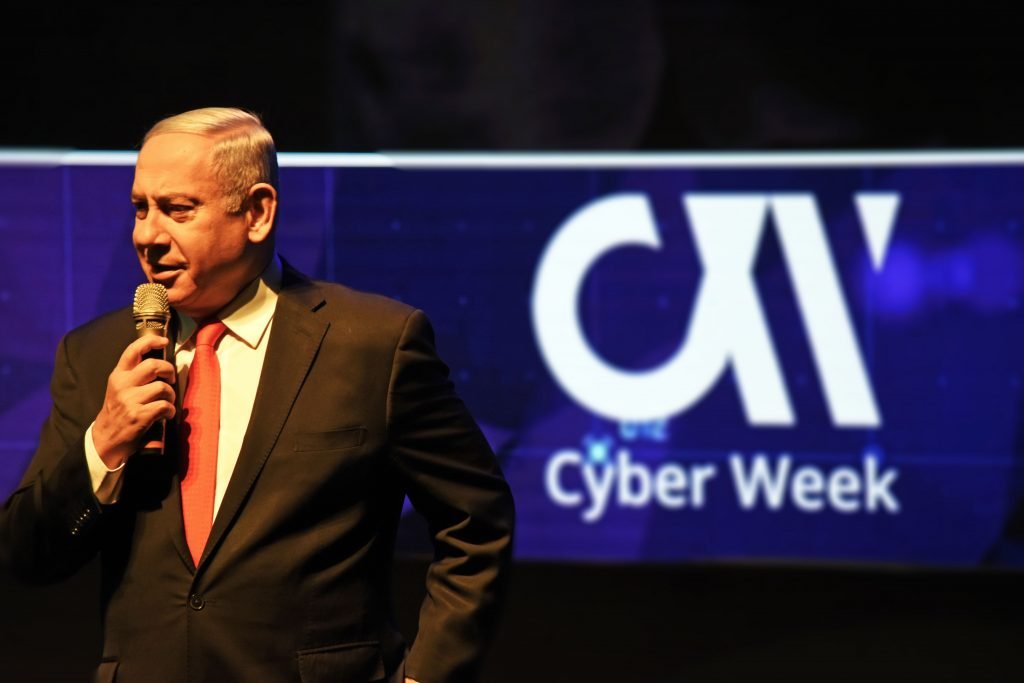Israel’s cyber activities helped thwart terror attacks in dozens of countries across the world, Israeli Prime Minister Benjamin Netanyahu revealed on Wednesday at the 9th annual Cyber Week conference at Tel Aviv University.
Netanyahu referenced Israel’s role in helping foil a 2017 plot by the Islamic State to blow up a plane headed from Sydney to Abu Dhabi, and said, “if you multiply that times 50, that would give you an idea of the contribution that Israel has made in protecting against terrorist activities, especially by ISIS [Islamic State] in dozens of countries. And most of those contributions were made with cybersecurity.”
Israeli had previously disclosed that its intelligence agencies had passed on information on intercepted communications between Sydney and Islamic State terrorists in Syria to Australian authorities, who stepped in to stop the attempted attack. Reports in 2018 said Israel’s IDF Unit 8200, the Military Intelligence Directorate’s main information gathering unit, provided the information.
SEE ALSO: Mossad Chief Accepts Cyber Defender Award At Annual Cyber Week Confab
On Wednesday, Netanyahu divulged that the intelligence was obtained using cybersecurity tools.

The Israeli premier gave his yearly address on the state of Israel’s cybersecurity sector, hailing international cyber collaborations particularly with its top ally, the United States, and encouraging further cooperation to defend against cyber threats.
“We’re encouraging international associations. Both government to government in cooperation on the questions of cybersecurity, a very complex issue. We have today cooperation first with our great and irreplaceable ally the United States of America. We cooperate in cybersecurity as never before and in many other fields of intelligence,” the Israeli prime minister said.
Cyber threats, he said, affects “every country in the world, it affects every person in the world. It affects them not only in aviation and transportation, it affects them in everything. Israel has seized the opportunities and is meeting the dangers and we invite you to do the same with us in partnership.”
The world is “in the midst of a revolution,” and this revolution “has the heart of a machine, and that machine is cybersecurity,” he went on, elucidating that this ongoing cyber revolution presents “enormous challenges and enormous opportunities” that society must “combat and seize.”

The prime minister also praised the Israeli cybersecurity ecosystem, considered a powerhouse the world over. Last week, Israel signed an agreement with the World Bank’s Digital Development Partnership to support cybersecurity programs in developing nations, helping to prepare countries in Africa, Latin America, and Eastern Europe to face challenges in cyberspace.
When it comes to cybersecurity, Netanyahu said, “Israel has invested more than any other country proportionally.”
“We invest vast sums of money, probably number two in the western world, in our military intelligence, which goes to the army, the Mossad, to the Shin Bet [Israel Security Agency], and to other arms as well,” he noted.
Netanyahu credited Israel’s top-notch reputation in the field to its “enormous investment in human capital, people, who can deal with the internet, can deal with the ramifications of this revolution, both as workers and as entrepreneurs.”
Netanyahu was among 400 notable speakers at Cyber Week, a five-day conference featuring 40 diverse cybersecurity-related events throughout the Tel Aviv University campus. Over 8,000 participants from 80 different countries are attending the conference, which began on Sunday.
Other speakers included industry leaders such as Yigal Unna, the director of the Israel National Cyber Directorate, Mike Rogers, the former director of the NSA, and Muriel E. Bowser, Mayor of Washington, DC, just to name a few.
Unna, who spoke before Netanyahu and introduced the premier, said that 68 percent of companies in the Israeli economy experienced at least one cyber attack or attempted cyber attack over the past year, according to a survey conducted by the Israel National Cyber Directorate of more than 300 companies.
Sign up for our free weekly newsletter
SubscribeThe survey also showed that 84 percent of the participating firms maintain a cyber-defense budget, and 80 percent said that the issue of cyber-defense rated highly on their order of priorities, particularly companies in the fields of information and communications and those that operate internationally.

In his speech, Unna also noted that the Israeli cybersecurity industry was well on its way to breaking new records in capital raising in 2019. Over the past six months, 40 Israeli cybersecurity firms raised a total of $850 million, compared to $1.1 billion in 2018, he emphasized.
Israel has over 450 currently active cybersecurity companies and startups. It is also home to the second-largest number of cybersecurity deals globally in recent years, second only to the US, according to a 2018 report compiled by New York data firm CB Insights.
And since the beginning of 2019, Israeli cybersecurity firms recorded seven exits totaling some $1.5 billion.
Speaking about recent global cyber threats, Unna said Israel was prepared to defend itself against cyber attacks from any nation or state, singling out arch-foe Iran.
“Iran and its proxies continue to pose a main cyber threat to the Middle East,” he said. “Israel is prepared for cyber threats; we have the capability to respond forcefully to cyberattackers, and not necessarily on the same vector as the attack.”
Unna also presented data that showed that Iran was among the five most active state actors in cyberspace.
“The Iranians are and have been continuously active for a long period of time deploying broad attacks, including attacks to gather intelligence, attacks to cause shifts in mentality, as well as attacks intended to cause harm and destruction to systems. Iran is one of the only countries to execute destructive attacks, primarily against Gulf states,” he said.
Earlier this year, Netanyahu told thousands of participants at the annual Cybertech conference that Iran virtually attacks Israel every day.
SEE ALSO: Cybertech 2019: Israel Shows How Collaboration, Creative Technology Can Help Thwart Cyber Attacks
“Iran is attacking Israel with cyber [attacks] on a daily basis. We follow it and prevent it every day,” Netanyahu said.
“The main issue is that every country can be attacked and respectively, every country needs the combination of defense and attack capabilities and Israel has such capabilities. Many countries want to be exposed to our knowledge of the cyber industry,” he claimed at the time.
For a photo essay on Cyber Week 2019, see below.
Related posts

Editors’ & Readers’ Choice: 10 Favorite NoCamels Articles

Forward Facing: What Does The Future Hold For Israeli High-Tech?

Impact Innovation: Israeli Startups That Could Shape Our Future





Facebook comments